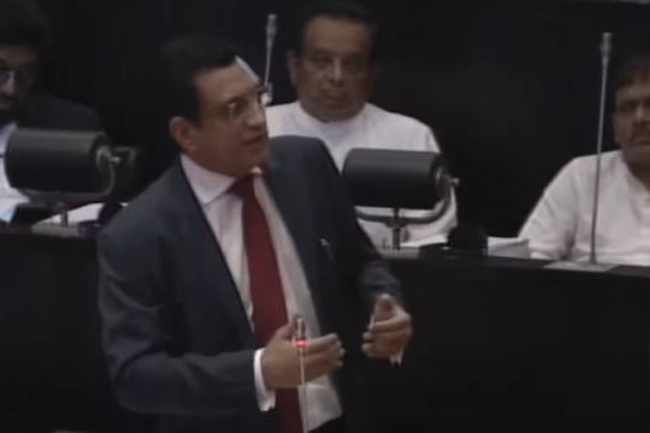Sri Lanka’s foreign liquidity reserves critically low, govt planning new budget: Sabry
May 4, 2022 11:19 am
Minister of Finance Ali Sabry, delivering a special statement in parliament today (May 05), revealed that Sri Lanka’s foreign liquidity reserves, which amounted to USD 7.6 billion by the end of 2019, have dropped to a critically low level below USD 50 million.
Speaking further, the lawmaker said the reserves declined to USD 5.7 billion by the end of 2020, as a result of gross inflows of USD 5.8 billion and outflows of USD 7.8 billion, including foreign currency debt service payments of USD 6.0 billion.
The reserves declined further to USD 3.1 billion by the end of 2021 consequent to the gross inflows of USD 7.9 billion and outflows of USD 10.4 billion, including foreign currency debt service payments of USD 6.8 billion and provision of foreign exchange of USD 1.2 billion to finance essential imports, the finance minister added.
“Accordingly, as of now, the usable liquid reserves are at negligible levels,” he pointed out, noting that this is severely impacting the importation of essential items, including fuel, LP gas and pharmaceuticals. The government is struggling to find enough foreign exchange to finance these essential imports, he added.
Delivering his statement, Minister Sabry said Sri Lanka is battling an unprecedented socio-economic and political challenge at present, and the root causes of these challenges go back to several decades of economic history although more recent developments have aggravated the situation into an acute crisis.
Speaking of the substantial tax cuts introduced by the government in late 2019, the finance minister said the intended results of this measure were not realized with the outbreak of the COVID-19 pandemic in Sri Lanka, which aggravated the situation in Sri Lanka.
Further, the revenue foregone due to the tax cuts introduced in late 2019, which was estimated to be more than Rs. 500 billion, has resulted in sovereign rating agencies downgrading Sri Lanka to near default levels, he added.
The finance minister is of the view that these tax cuts should have been gradually reversed in the new environment created by the COVID-19 pandemic. “What transpired instead was that the revenue loss led the Central Bank to print money and help the government to finance the deficit.”
With the government’s tax revenues depleted to 8.7% at present, Minister Sabry says the parliament must give priority to implement tax reforms to increase government revenue and rationalize expenditure whilst ensuring public investment in critical areas such as education, healthcare, and social protection.
The finance minister stressed that the time has come to follow a professional approach in resolving these issues rather than being swayed by ideological inclinations. “I accept the fact that the aggravation of the issues was due to the delay in restoring fiscal and debt sustainability and failing to preemptively address the decline in foreign reserves. Sri Lanka should have focused on regaining capital market access by establishing a credible path of macroeconomic stabilization, supported by institutions such as the IMF.”
With regard to the decision to seek the assistance of IMF, the finance minister said it is important in this context. An IMF programme will be a catalyst to undertake the much-needed reforms and will provide a signal to the rest of the world that Sri Lanka is serious in addressing its economic difficulties.
“But we must realise that the economic reform programme we embark upon must be a programme with Sri Lankan ownership. We must put forward a professional and analytically robust economic plan, where the IMF will also provide technical assistance and then endorse. Without that Sri Lankan ownership, and without broad consensus of the legislature, we would not succeed in providing permanent solutions for our longstanding economic issues.”
Speaking further, the minister said the fundamental macroeconomic weaknesses in the economy have been decades in the making. The recent shocks such as the COVID-19 pandemic and the Ukraine conflict have exposed the underlying weaknesses such as fiscal instability, accumulated debt overhang, low productivity and persistent current account deficits. “However, we should also be humble enough to admit that this situation has occurred due to some of the misaligned and imprudent policies implemented in the recent past as well.”
It is time for Sri Lanka to establish a broad political consensus on the economic path forward for the country, Minister Sabry said further, explaining that every time there has been an attempt to establish long term solutions, these are reversed in the next election cycle with a promise of short-term benefits and relief.
The adverse outcome of these stop-go policies are experienced today, he added.
Noting that we should understand the root cause of the issue such as the unsustainable fiscal policies adopted by many successive governments, the finance minister stated that “We, as a country, have lived beyond our means.”
Without proper checks and balances, all governments have spent much more than what they earned, of course with the approval of the parliament, under which the responsibility for public finances falls, he continued.
Minister Sabry also revealed that the government intends to present a new budget proposal in the parliament soon, through which the income taxes are expected to be increased.












